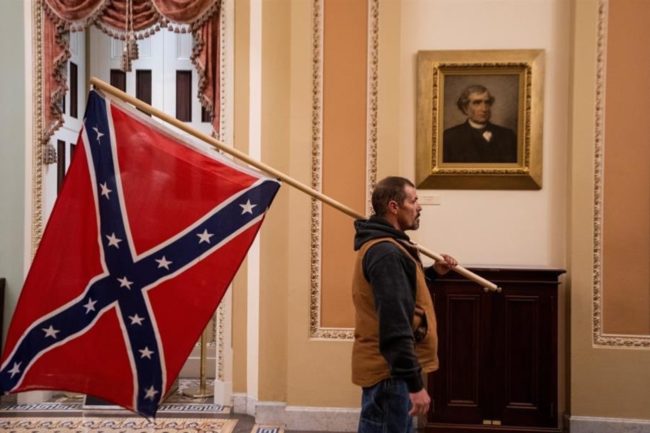 December 17, 2021 02:43 PM UTC
December 17, 2021 02:43 PM UTC

Over 95% of the tumultuous year that was 2021 is in the books now, and over the next couple of weeks (as long as the news cycle permits) we’ll be recapping many of the events and prevalent trends that defined Colorado politics this past year. Here in Colorado as with most of the country the political uncertainty following the January 6th insurrection at the U.S. Capitol has been the principal driver of political controversy, both galvanizing Democrats alarmed at the prospect of violent overthrow of American democracy and dividing Republicans into pro-Trump versus pro-democracy factions.
The failure by ex-President Donald Trump to overturn the results of the 2020 presidential election after the violence at the U.S. Capitol could have marked a turning point. Unfortunately, the refusal by Republicans to hold Trump and his many accomplices in Congress accountable for January 6th has substantially normalized what happened that day–even while law enforcement authorities continue to aggressively prosecute individual offenders.
As the Washington Post’s Dana Milbank writes today, the gears of democracy that jumped on January 6th have not righted themselves, and as a consequence the nation is closer to widespread political violence than it has been in generations:
Barbara F. Walter, a political science professor at the University of California at San Diego, serves on a CIA advisory panel called the Political Instability Task Force that monitors countries around the world and predicts which of them are most at risk of deteriorating into violence. By law, the task force can’t assess what’s happening within the United States, but Walter, a longtime friend who has spent her career studying conflicts in Syria, Lebanon, Northern Ireland, Sri Lanka, the Philippines, Rwanda, Angola, Nicaragua and elsewhere, applied the predictive techniques herself to this country.
Her bottom line: “We are closer to civil war than any of us would like to believe.” She lays out the argument in detail in her must-read book, “How Civil Wars Start,” out in January. “No one wants to believe that their beloved democracy is in decline, or headed toward war,” she writes. But, “if you were an analyst in a foreign country looking at events in America — the same way you’d look at events in Ukraine or the Ivory Coast or Venezuela — you would go down a checklist, assessing each of the conditions that make civil war likely. And what you would find is that the United States, a democracy founded more than two centuries ago, has entered very dangerous territory.” [Pols emphasis]
Indeed, the United States has already gone through what the CIA identifies as the first two phases of insurgency — the “pre-insurgency” and “incipient conflict” phases — and only time will tell whether the final phase, “open insurgency,” began with the sacking of the Capitol by Donald Trump supporters on Jan. 6.
The over-the-top militant rhetoric of today’s Republican Party, which Rep. Lauren Boebert’s bellicose low-information vitriol is a sterling but by no means unique example of, has in many ways desensitized society from the warning signs of impending violence very clearly broadcast in the weeks leading up to the January 6th insurrection. The fear and shock expressed by some close confidants (and family) of ex-President Trump revealed in text messages this week could have helped put an end to Trump’s corrosive hold on the GOP had it been sustained, but it wasn’t. All of those people simply resumed their roles as defenders of Trump once the dust settled and became fierce deniers of the magnitude of January 6th.
Today in Colorado, the state Republican Party is in a state of existential crisis as a far-right organizing group with an armed militia wing has taken control of numerous county party organizations, and the leader of which is now openly threatening to hang Gov. Jared Polis along with a list of Republican U.S. Senators he considers traitors on “gallows all the way from Washington, D.C., to California.” The state is the epicenter of one of the principal election conspiracy theories emanating from the 2020 presidential elections, albeit thoroughly debunked still provoking threat-laden protests openly cheered on by prominent local Republican officials.
If you had asked us before January 6th if we really thought violence on that scale could happen inside the U.S. Capitol despite the worst-case concerns being no secret at that time, we would have said no. Almost a year later, that innocence seems quaint–and the root causes of the violence of January 6th have in no way been dealt with.
And with that innocence lost, it is necessary to rethink what is unthinkable.
Subscribe to our monthly newsletter to stay in the loop with regular updates!
Comments